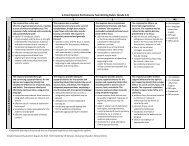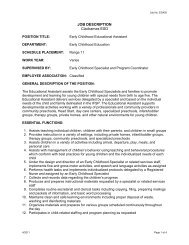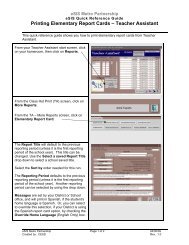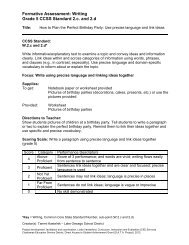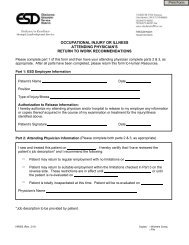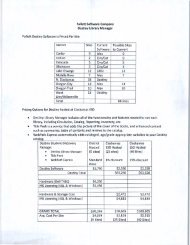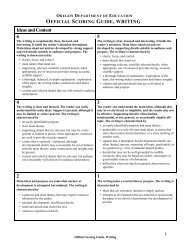LSP1112_Annual Rpt0910Rev.indd - Clackamas Education Service ...
LSP1112_Annual Rpt0910Rev.indd - Clackamas Education Service ...
LSP1112_Annual Rpt0910Rev.indd - Clackamas Education Service ...
You also want an ePaper? Increase the reach of your titles
YUMPU automatically turns print PDFs into web optimized ePapers that Google loves.
Programs for Children with Special Needs<br />
Overview<br />
<strong>Clackamas</strong> ESD provides special education services for eligible<br />
children ages birth to twenty-one with a range of learning needs.<br />
These services are provided in age appropriate settings including<br />
family homes, community settings, and public school classrooms.<br />
Related services, specialized consultation, case management<br />
services, and education and support services for families are<br />
also offered. The Departments of Early Childhood and Special<br />
<strong>Education</strong> anticipate providing direct services to over 1,400<br />
students and their families in the 2010-2011 school year and<br />
will complete approximately 1,500 evaluations.<br />
Resolution <strong>Service</strong>s<br />
Child Evaluation and <strong>Service</strong> Center<br />
The Child Evaluation and <strong>Service</strong> Center provides evaluation<br />
services for students suspected of or identified as having a<br />
disability under the Individuals with Disabilities <strong>Education</strong><br />
Act (IDEA). Multidisciplinary<br />
evaluations are designed to<br />
determine the learning needs<br />
of the student and provide the<br />
resident district information to<br />
establish whether the student<br />
has a disability and is in need<br />
of special education, or to<br />
provide information designed<br />
to improve instruction and<br />
increase school success for<br />
students already identified as<br />
eligible for special education<br />
services. Areas of evaluation<br />
are individualized for each<br />
student. The Center provides<br />
evaluations in the following<br />
areas: academic skills, speech/language communication,<br />
cognitive function (intelligence), social-emotional/behavioral,<br />
adaptive behavior, language proficiency, and attentional<br />
capacity. Bilingual evaluations are provided for students whose<br />
first language is Spanish or Russian. For other languages,<br />
evaluations for students with limited English are accomplished<br />
through the use of interpreters.<br />
The results of these evaluations are written in a multidisciplinary<br />
team report and shared during a conference with the student’s<br />
parents and school personnel. The Center provides assistance to<br />
school teams for functional behavioral assessment and behavior<br />
plan development. In addition, school or district development of<br />
Positive Behavior Intervention Supports and Behavior Prevention/<br />
12<br />
Crisis Intervention are provided through professional development<br />
and technical assistance.<br />
Evaluations and consultation for students with unique medical<br />
or dietary needs who require specific individualized feeding<br />
procedures at school will be available through a trained multidisciplinary<br />
team through a collaboration with the Columbia<br />
Regional Program or by contract with a qualified community<br />
agency with expertise in feeding services.<br />
Early Intervention Early Childhood Special <strong>Education</strong><br />
Evaluation Center<br />
Initial evaluation services are provided for young children birth to<br />
school age suspected of having a disability under the Individuals<br />
with Disabilities Act (IDEA). Evaluations are completed by a<br />
team of professionals knowledgeable in the evaluation of young<br />
children and may include an early childhood specialist, speech<br />
and language pathologist, occupational therapist, and physical<br />
therapist. Evaluations include an observation of the child in a<br />
comfortable setting, in-depth interviews with family members, and<br />
an evaluation in all developmental areas of concern, including<br />
receptive and expressive communication, adaptive, social/emotional,<br />
fine and gross motor skills, and cognitive skills. A written<br />
report including planning suggestions is prepared, and results<br />
of the assessment are shared with the family. Determination of<br />
eligibility for early intervention/early childhood special education<br />
services is made through this evaluation process.<br />
Life Enrichment <strong>Education</strong> Program<br />
Students age five through twenty-one receive specially designed<br />
instruction and related services through the Life Enrichment <strong>Education</strong><br />
Program (LEEP). Eligible students referred by their local<br />
school district have moderate to profound levels of mental retardation,<br />
which also may be accompanied by secondary disabilities<br />
including autism, vision, hearing, other health impairments, or<br />
orthopedic impairments. The curriculum focuses on personal<br />
management, communication,<br />
functional<br />
living skills, vocational<br />
skills, leisure and<br />
recreation activities,<br />
and social/behavioral<br />
skills. Based on the individual<br />
needs of each<br />
student, CESD offers<br />
speech and language<br />
therapy, occupational therapy, physical therapy, adaptive PE,<br />
specialized behavioral consultation, and nursing support. The<br />
LEEP program also provides an extended school year program<br />
in the summer for students who would regress during a lengthy<br />
educational recess. Excess special education costs due to the<br />
CESD Local <strong>Service</strong> Plan 2011-2012



